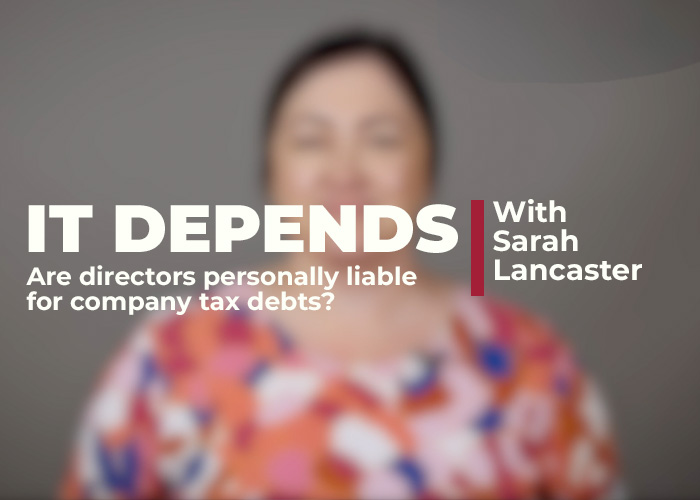Video transcript
Hi, I’m Sarah Lancaster, a partner at Cooper Grace Ward, specialising in tax advice and tax disputes, and welcome to today’s edition of It Depends. Today, we’ll be looking at whether or not company directors can be liable for the company’s tax debts. Over the last few weeks, we’ve seen a noticeable increase in the recovery action that the ATO are taking after the tax debts blew out during COVID. Now, as a part of this, apparently the ATO are issuing around and on average 60 director penalty notices each day, seeking to recover director penalties from directors of companies that have outstanding PAYG withholding, superannuation and GST liabilities.
When is a director personally liable for a company’s tax liabilities?
So, directors of company have an obligation to make sure that that company reports and pays its tax obligations, including its PAYG withholding, superannuation and GST on time. If the company doesn’t comply with this obligation, then the directors become liable for a penalty in relation to the outstanding amount of PAYG withholding, superannuation or GST. Before the ATO can take steps to then recover that penalty against the director, they need to serve what’s called a director penalty notice or a DPN on the relevant director.
What is a DPN?
So, a DPN identifies the specific director penalty that the director is liable for and also sets out the steps that the director may be able to take to remit the director penalty. There are two different options for a director penalty to be remitted under the DPN regime, and each option depends on whether or not the company has reported the relevant tax obligation on time or within three months of the relevant due date for the reporting. So the first option is what is referred to as a lockdown DPN and it relates to a director penalty that is, as you can probably guess, locked down and its locked down in the sense that it can only be remitted if the company or the directors pay the relevant tax obligation or director penalty. Now, the reason that this occurs is under the legislation you will have a lockdown director penalty where the company has failed to report the relevant tax obligation within three months of the due date. So, for example, the company’s failed to lodge its BAS within three months of the due date of that BAS. That’s why it’s very important for companies to still comply with their lodgement obligations and make sure they’re lodging all documents on time. A non lockdown DPN refers to a director penalty that can be remitted if the director takes steps within 21 days of the director penalty notice being received to either cause the company to repay the relevant tax obligations and comply with the tax obligations, to appoint an administrator, or to appoint a small business restructuring practitioner, or to take steps to wind up the company. A non lockdown DPN will apply where the company has made all of its lodgements either by the due date or within three months of the due date. So again, it’s really important that companies are still continuing to make sure that all of their lodgements are made on time.
Are there any defences to a director penalty?
There are two key defences that might apply to a DPN liability. The first one is where it was reasonable and for the director not to take part in the management of the company and the director actually didn’t take part in the management of the company at the time that they were a director. And the second one is called the All Reasonable Steps Défense. And that one will apply where the director took all reasonable steps to ensure that the company either complied with its obligation to pay the relevant tax liabilities or where the director took steps to appoint an administrator or where the director took steps to appoint a small business restructuring practitioner in respect to the company or took steps to wind up the company, or alternatively, that there were no reasonable steps that the director could have taken.
What happens if there is more than one director?
It’s a really great question. A director penalty is what’s referred to as a parallel liability. So, the director penalty itself is a separate liability that rests with the director and is separate from the company’s liability to pay the relevant amount of PAYG withholding, superannuation guarantee charge or GST to the commissioner. So, what this means is that usually the ATO will seek to recover a director penalty from all of the relevant directors at the same time. It also means that where one director or where the company makes a payment towards the relevant liability, that will then reduce the other liabilities owed by the directors and the company.
What should you do if you receive a DPN?
So, the first tip is to make sure that you act quickly. Director penalties have a strict 21 day notice for compliance. So, if you’re looking at and if you have received a lockdown director penalty, then we really need to be considering steps that can be taken to make sure that that debt is paid or that liability is paid within the 21 day time frame. The second tip is to make sure that you engage with the ATO early. So if, for example, a director can avail themselves of one of the defences to the director penalty, it’s important that you put together submissions on the application of that defence to the circumstances sooner rather than later. Finally, for current company directors, it’s really important to make sure that the company’s judgments are up to date and made on time. But as always, if you’ve received a DPN and want to talk about this issue further, please contact me or a member of the team.





